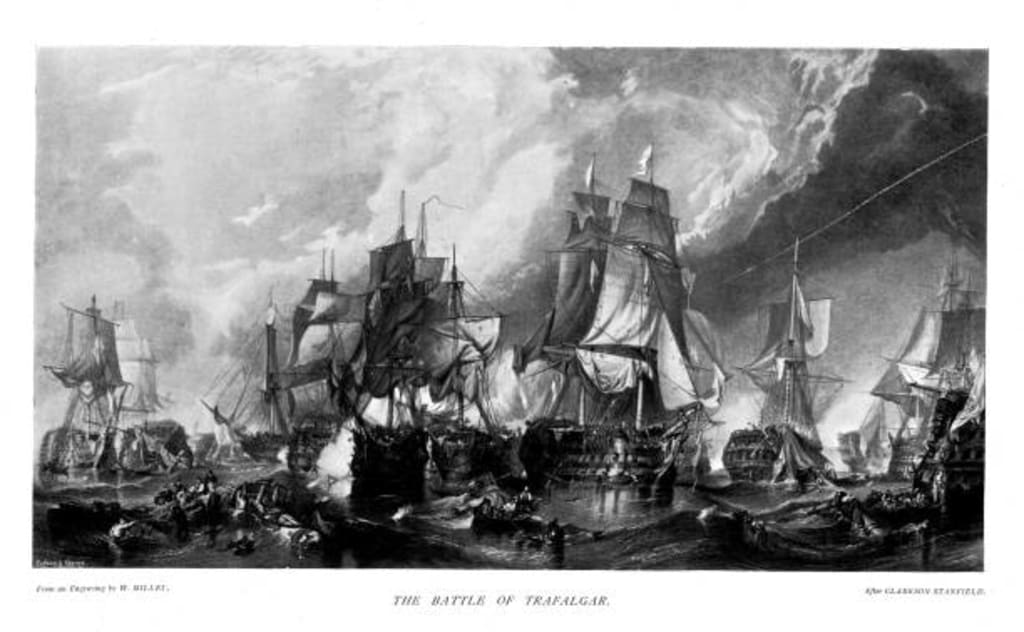The Battle of Trafalgar: Turning the Tide of Naval History
Horatio Nelson's Triumph: Unveiling the Epic Battle of Trafalgar and Its Enduring Impact on Naval Strategy and Heroism

The Battle of Trafalgar, fought on October 21, 1805, during the Napoleonic Wars, stands as a pivotal moment in naval history. It pitted the British Royal Navy against the combined fleets of France and Spain, with the outcome not only securing British naval supremacy but also altering the course of the Napoleonic conflict. This article delves into the intricate details of the Battle of Trafalgar, the key players, strategies, and its lasting impact on the world.
The Context and Stakes:
The early 19th century saw Europe engulfed in the Napoleonic Wars, as the ambitious French Emperor Napoleon Bonaparte sought to expand his influence across the continent. Britain, led by Admiral Horatio Nelson, stood as a steadfast opponent to Napoleon's imperial aspirations. The battle took place off the southwestern coast of Spain, near Cape Trafalgar, a location strategically chosen by Nelson to intercept the Franco-Spanish fleet.
The Commanders and Strategies:
Admiral Horatio Nelson, renowned for his audacious tactics and brilliant leadership, commanded the British fleet. His innovative approach involved dividing his ships into two columns, aiming to pierce through the Franco-Spanish line, thereby disrupting their formations and isolating their ships for individual engagements.
On the Franco-Spanish side, Admiral Pierre-Charles Villeneuve led the combined fleet. Villeneuve's strategy was more conventional, focusing on maintaining a solid line formation to overpower the British ships.
The Battle Unfolds:
As the fleets engaged in battle, Nelson's daring tactics proved decisive. His two-column approach surprised the Franco-Spanish fleet, causing confusion and disorder among their ranks. The British ships engaged the enemy at close range, utilizing their superior gunnery skills to devastating effect.
During the intense fighting, Admiral Nelson was fatally wounded by a sniper's bullet, an event that deeply affected the British fleet. However, Nelson's legacy and strategic brilliance endured, guiding his fleet to victory.
The Aftermath and Impact:
The Battle of Trafalgar resulted in a resounding victory for the British, who captured or destroyed 22 of the 33 Franco-Spanish ships. The battle solidified British naval supremacy, ensuring their dominance on the high seas for decades to come.
The victory, however, came at a heavy cost, as Admiral Nelson lost his life in the midst of the battle. His death made the victory bittersweet, yet his legacy as a national hero endured in British history.
Strategically, the battle shattered Napoleon's hopes of invading Britain and forced him to look for alternative avenues to assert his dominance. The defeat also led to internal conflicts within the Franco-Spanish alliance.
The Enduring Legacy:
The Battle of Trafalgar has left an indelible mark on naval warfare and history. Nelson's innovative tactics, including the concept of breaking the enemy line, influenced naval strategies for generations. The battle also solidified the British naval tradition, inspiring a sense of pride and confidence that resonates to this day.
In conclusion, the Battle of Trafalgar was a defining moment in naval history, reshaping the balance of power on the seas and leaving an enduring legacy of valor, innovation, and strategic brilliance. This clash of titans between British and Franco-Spanish fleets reminds us of the pivotal role naval battles have played in shaping the course of history.
Remembering the Heroes:
The Battle of Trafalgar is not only a story of tactics and strategy but also one of heroism and sacrifice. The figure of Admiral Horatio Nelson, whose leadership and daring maneuvers led to victory, remains an inspiration to this day. Nelson's last words, "Thank God I have done my duty," serve as a testament to his unwavering commitment to his nation and his duty as a naval officer.
As we reflect on the Battle of Trafalgar, we remember the brave sailors on both sides who faced the tumultuous seas and the thundering cannons. Their courage and determination amidst the chaos of battle are a testament to the human spirit's resilience and the unbreakable bonds that tie people to their countries and causes.
In essence, the Battle of Trafalgar is more than a historical event; it is a tapestry woven with valor, sacrifice, and the pursuit of a higher ideal. It reminds us that even in the face of overwhelming odds, individuals and nations can leave an indelible mark on history when guided by unwavering dedication and courage
About the Creator
NilSercan
Exploring the world through words. Join me on a journey of knowledge and exploration
Enjoyed the story? Support the Creator.
Subscribe for free to receive all their stories in your feed. You could also pledge your support or give them a one-off tip, letting them know you appreciate their work.






Comments
There are no comments for this story
Be the first to respond and start the conversation.